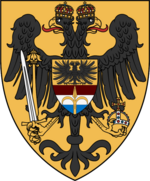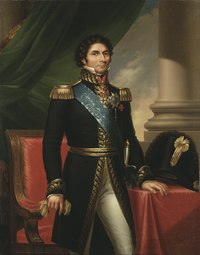House de Weluta
This article is a work-in-progress because it is incomplete and pending further input from an author. Note: The contents of this article are not considered canonical and may be inaccurate. Please comment on this article's talk page to share your input, comments and questions. |
| House de Weluta House of Urcea, House of Caroline, Carolines | |
|---|---|
| Royal House | |
 | |
| Country | Urcea |
| Founded | 14th Century |
| Current head | King Riordan VIII |
| Titles | List of titles
|
| Style(s) | His Most Christian Majesty (for the King) His/Her/Your Christian Highness (for close relatives of the King) His/Her/Your Excellency (for all other family members) |
| Motto | Via et veritas et vita (The way, the truth, and the life) |
| Estate(s) | List of properties owned |
The House de Weluta is the reigning royal house of the Apostolic Kingdom of Urcea as well as the Kingdoms of Talionia and New Harren. The house originated as a cadet branch of the Julian dynasty. Emerging victorious from the Saint's War and Great Interregnum in the 14th Century, the House de Weluta has ruled over Urcea with two notable interruptions since. Several of its members, beginning with Emperor Leo III, have reigned as Emperor of the Levantines, and since the Second Great War that title has been permanently associated with the dynasty.
Like all other Royal houses throughout the history of Urcea, the House de Weluta is the "great house" of the Estate of the Julii within the Estates of Urcea. King Riordan VIII is the head of the House de Weluta and Custóir of the Julii Estate. The main line of the House is sometimes distinguished from the rest of the House by being referred to as the "Carolines", or even more rarely, the "House of Caroline", based on the agnomen adopted under the tria nomina system, Carolinicus.
Name
The source of the house's name is a matter of significant contention. Both "Welutes", "Velucians", and "Welutians" are attributed in the historic record as residing at Castle Welute as early as ca. 1310. Traditionally, the House was attributed to a mythic figure, "Chief Veluti the Great," who allegedly resisted the incursion of Gallawa into his clan's lands in Ionia for two decades in the 8th century, but almost all historians believe this story to be fiction. Although some historians suggest that the family is actually named for the castle, linguists do suggest that "Welut" is a real name originating from Ionia in the early medieval period based on the roots of the word. Regardless of precise origin, the term "House of Welute" and various formulations thereof were in common use referring to the family by ca. 1390.
History
Origins
During a lengthy period of dynastic struggle in Urcea's history known as the Saint's War, the House of Julio-Aleckán - direct heirs of Saint Julius of the Caeline - fought for control of the Julian Throne. Struggling with the House of Cónn, the Urcean Crown changed hands five times before the beginning of the Great Interregnum, a period in which Urcea was divided into the Archduchy of Urceopolis and Grand Duchy of Harren, with the holder of each claiming to be King but Urceopolis itself in the hands of the Papacy. The Aleckán dynasty died out during this period, and the Grand Duchy of Harren passed to a cadet branch, the House de Weluta.
Prior to its involvement in the dynastic feuds for the Urcean Crown, the Welute or Velucian Clan was a relatively minor clan in the Ionian Plateau in the eastern part of Urcea, but came into some prominence as a mercenary band during the Saint's War. King Lucás I of the House of Julio-Aleckán enlisted the Velucian clan's aid in seizing Urceopolis in 1312 and were soon recognized as stalwart allies of the Aleckán dynasty. As a reward for their efforts in 1312 the clan was granted lands in the Archduchy of Urceopolis, including one with a large outcropping of granite. The clan built Castle Welute and the lead branch of the clan became the House de Weluta from that point forward, though the Velucian Clan continued to exist in some form in the highlands until the middle of the 16th century. House de Weluta became a part of the Julian dynasty in 1348 when its leader defeated an advancing force of the Holy Levantine Empire which intended to resolve the Saint's War in favor of the Emperor, and consequently the house head was awarded with a daughter of the Aleckán Archduke at the time. Their marriage would result in several children, including the father of the future Apostolic King of Urcea Lucás II.
First reign in Urcea
Second reign in Urcea
Current reign in Urcea
At the end of the First Great War, King Patrick III was restored to the throne of his father, Aedanicus VIII. The restoration inaugurated the restored and current reign of House de Weluta over Urcea. The current reign saw a minor dynastic crisis during the mid 20th century. King Brian IV had several male heirs, and upon his death in 1947 his eldest son Lucás IV was crowned King. Lucás was assassinated in 1949, bringing his brother Patrick IV to the Throne. Patrick was unable to have children despite significant efforts to do so. He died in 1967 following an 18 year reign, handing the throne to his brother Donnchad IV. Fortunately for both Urcea and House de Weluta, Donnchad had a son Aedanicus, born in 1927, who became Apostolic King in 1971. Accordingly, the succession remained uncertain for nearly two decades. Aedanicus IX's long reign and many children were marred with the unfortunate death of his son and heir, Aedanicus the Prince of Halfway, in 1996. The Prince of Halfway's son, Riordan, became Prince of Halfway and thus heir, becoming King Riordan VIII after the death of his grandfather in 2006.
Abroad
House de Weluta has assumed crowns abroad at various times beginning in the 18th century. For the most part, these crowns were new realms held in personal union with the Apostolic King of Urcea, such as the late 18th century creation of Talionia or early 21st century creation of New Harren. There are some prominent exceptions to this general rule. In 1824, Corio de Weluta was crowned King Arathvesur I of Paulastra, bringing the still-reigning Julian dynasty to that country. The direct de Weluta line ruling Paulastra ended in 1890.
Realms
Urcea
In the later portions of the Great Interregnum, the House de Weluta suceeded the Aleckán dynasty as head of the Aleckán faction, and in so doing the de Welutas inherited the Archduchy of Urceopolis. Galvanizing the highland clans and Aleckán loyalists, Lucás de Weluta managed to end the Saint's War at the Battle of Glens Falls in 1401, becoming Apostolic King of Urcea. While some questioned the legitimacy of the de Welutas on the account of "mere" female succession from the Aleckáns, King Lucás II married the Cónn heiress following the battle, uniting the two branches of the Julian dynasty under House de Weluta.
While the house was briefly deposed during the 16th century, it was restored during the Great Confessional War with King Leo II emerging victorious over Protestant rivals in 1565. The house was again briefly deposed prior to the Red Interregnum but was restored in 1902.
The de Welutas have held the Apostolic Kingship for longer than any other branch of the Julian dynasty, reigning interrupted since 1402, a total of 540 years as of the accession of Riordan VIII in 2006 out of a total of 908 years of the existence of the Kingship. Riordan VIII, upon his accession, became the 34th Urcean monarch from the House out of a total of 53 Urcean monarchs. In that time, the de Welutas have become closely associated both with the Kingship itself as well as Urcea as a whole. Efforts to remove the de Welutas in favor of other members of the Julian dynasty have been thwarted on multiple occasions, most recently due to public outcry in 1896.
Holy Levantine Empire
House de Weluta has a long and sometimes troubled history with the title of Emperor of the Levantines, a title it now holds permanently following the Treaty of Corcra. Between the beginning of the Imperial reign of King Leo the Great in 1572 and the end of the reign of King Lucás III in 1798, members of House de Weluta had held the Imperial throne for 113 of 226 years, despite efforts to remove them - most prominently in the events surrounding the War of the Caroline Succession. Following the removal of the House from Imperial office in 1798 during the Second Caroline War, House de Weluta assumed what had been an unprecedented posture of antagonism towards the Empire, beginning the century-long Recess of the Julii. Restored to Imperial authority in 1920, House de Weluta has held the throne ever since, including as part of the legal pretense of the Empire-in-fact.
The long relationship between House de Weluta and the Empire is reflected on the family's arms, which include the large Imperial Eagle as the primary part of the arms and the smaller house arms in escutcheon. The Imperial Eagle also appears in the smaller shield from the period of the 18th century Imperial reign.
Talionia
Paulastra

After the establishment of Paulastra as an independent nation, the new realm sought a King abroad. In 1824, Corio de Weluta - a cousin of then-King Niall V and primary author of the Great Bull of 1811 - was invited to take the Paulastran throne. Upon his accession, he took the Coscivian regnal name King Arathvesur I. The direct de Weluta line would rule in Paulastra through the reigns of Arathvesur, his son Xitomer, and his granddaughter Arathvesura, lasting from 1824 through 1890. Arathvesura married a local noble, establishing the new House of Newaster. The House of Newaster, and its successor Newaster-Tuskane, can trace its lineage to House de Weluta and still reigns in Paulastra today. They continue to share heritage with House de Weluta two parts of the broader Julian dynasty.
New Harren
In the 1850s, Urcea established a small colonial hold in Crona called New Harren, and accordingly House de Weluta ruled over this territory as a foreign rectory of Urcea for a century and a half. In the wake of the War of the Northern Confederation, New Harren was reorganized as a Kingdom, and Riordan VIII was crowned King Riordan I of New Harren on 4 December 2010.
House traditions
House de Weluta has a number of familial customs and traditions that have developed during its time at the head of Urcean society.